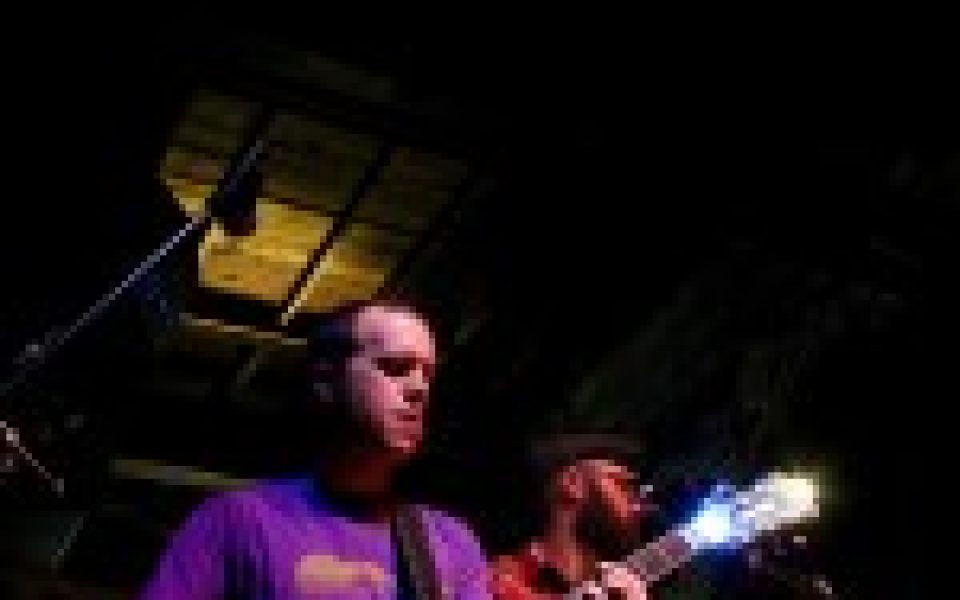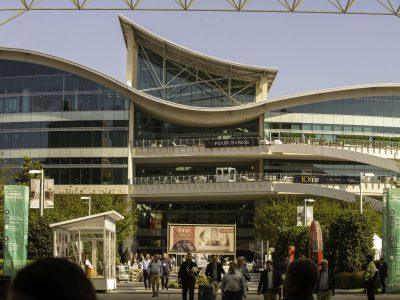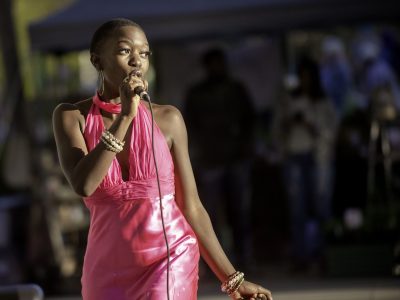Molly McGinn (left) with David Brewer and David Willis of Possum Jenkins (photo by Ethan Green)
by Jordan Green
About halfway through Possum Jenkins’ annual post-Thanksgiving show at the Garage in Winston-Salem, Molly McGinn took the stage with an acoustic guitar. She played a couple songs, accompanied only by electric guitarist David Willis as the rest of the band took a break.
They tried out some covers — “The Gambler” by Kenny Rogers” and “That’s the Way That the World Goes Round” by John Prine — more as a concession to the sentimentality of the holiday season than as an artistic statement, and then moved through a triad of tunes written by McGinn. By the third number, a song called “John Cash Jeans,” all but two of the players had returned to the stage.
“I’ve been severely pining to be an honorary member of Possum Jenkins since I saw them at a battle of the bands at the old Ziggy’s about 10 years ago,” McGinn confided, before bandleader David Brewer and guest keyboardist David McCracken returned to the stage to join her for a bluesy rendition of the civil rights anthem “Eyes on the Prize.”
With more than a decade of playing in and around northwest North Carolina and handful of albums worth of original material, Possum Jenkins has become more of an extended family gathering than a self-contained unit. It’s no wonder McGinn never received an official invitation to join the band as a songwriter, vocalist and guitarist: Brewer, Willis and Nathan Turner all sing and play guitar, with each rotating through drum duties. Willis’ restrained honky-tonk vocals complement Brewer’s gospel-leaning soul-singer approach, while Turner delivers straight on, heart-tugging country. As the most developed guitarist in the group, Willis accents the songs with tasteful licks and atmospheric texture, but the band’s lead instrumentalist is clearly harmonica player Brent Buckner.
It’s a perilous exercise to try to categorize Possum Jenkins’ music. They draw as much from the outlaw country of Confederate Railroad as the punk-inspired alt-country of Son Volt, both of whom they covered at their Nov. 27 show at the Garage. Much of the band’s music carries an overlay of twang. Their vocal hollers and stomping rhythm proudly represent Appalachia, while they’re also capable of delivering a sinuous country-funk sound that could place them in northern Mississippi hill country as easily as the southern Louisiana bayou. Buckner’s high, piercing harmonica playing, which would sound just as at home with George Jones as with the Staple Singers, is the special ingredient that holds everything together.
While the drums were stationed forward onstage, Buckner projected his big sound from the background, positioned side by side with bassist Jared Church, while peering over Willis’ shoulder. Buckner frequently riffed off Church’s monster groove, with the two sharing a strong musical and personal chemistry.
McCracken, who plays Hammond organ and piano with Donna the Buffalo, joined Possum Jenkins for their annual Winston-Salem Thanksgiving show — past concerts have taken place at Ziggy’s and the defunct Rubber Soul — for the second year in a row. A Greensboro resident now based in upstate New York, McCracken said after the show that Possum Jenkins exemplifies North Carolina music to him. His reverb-heavy piano and ecstatic, going-to-church flair made a perfect complement, drawing out the band’s funky side.
“He earns his paycheck playing with Donna the Buffalo, but we’re going to put him on retainer,” Brewer joked from the stage. “Which means we’re going to take him to an old house out in the county and lock him up until the next gig.”
As the night wore on, the Possum Jenkins’ set became increasingly raucous and loose. Starting around 9:15 p.m., they played until just after midnight. In contrast to the current indie-rock paradigm of hour-long sets tightly curated to put across a signature sound, Possum Jenkins went long, providing ample space for stylistic exploration and permutations of the lineup. The format also fits the time-honored tradition of holding the crowd in thrall to keep them going back to the bar for more. Both Brewer and McGinn made a point of exhorting the crowd to tip the bartender generously, displaying an old-fashioned sense of their function as entertainers.
McGinn’s talent as a songwriter and vocal stylist is estimable, and she is a spare but effective guitarist. For various reasons, it made more sense to create an offshoot than to officially incorporate her into Possum Jenkins. She started performing with members of the band, with the exception of Brewer, several years ago at an open mic at Old Winston Social Club. Thus was born Wurlitzer Prize, a band that showcases McGinn’s material. It’s the same lineup — adding McGinn while subtracting Brewer. The lineup of Wurlitzer Prize also makes sense geographically and logistically, as all the members of Possum Jenkins live in Winston-Salem, while Brewer resides in Boone.
As McGinn was leaving the stage at the end of her interlude, Brewer magnanimously talked up Wurlitzer Prize’s forthcoming album, which will be produced next year with funding from the Arts Council of Winston-Salem & Forsyth County.
As a collaborator, McGinn brought a different chemistry, particularly with Willis. She played percussive rhythm guitar as a handshake to Willis’ mercurial lead electric guitar on her song “Overtime.” Losing all the tentativeness of her two cover selections, she fully committed to the vocal on “Does Your Man Drink?”, a deep classic country song that brings to mind Loretta Lynn or early Dolly Parton.
And when the band fumbled to get the music right for “John Cash Jeans,” the rough faith implied in the song’s refrain made a certain kind of sense: “Seems these days I’ve been skimming more than I’ve been sliding/ Oh, without even trying/ Seems these days I’ve been quitting more than I’ve been trying/ Oh, you just keep driving.”
Join the First Amendment Society, a membership that goes directly to funding TCB‘s newsroom.
We believe that reporting can save the world.
The TCB First Amendment Society recognizes the vital role of a free, unfettered press with a bundling of local experiences designed to build community, and unique engagements with our newsroom that will help you understand, and shape, local journalism’s critical role in uplifting the people in our cities.
All revenue goes directly into the newsroom as reporters’ salaries and freelance commissions.












Leave a Reply